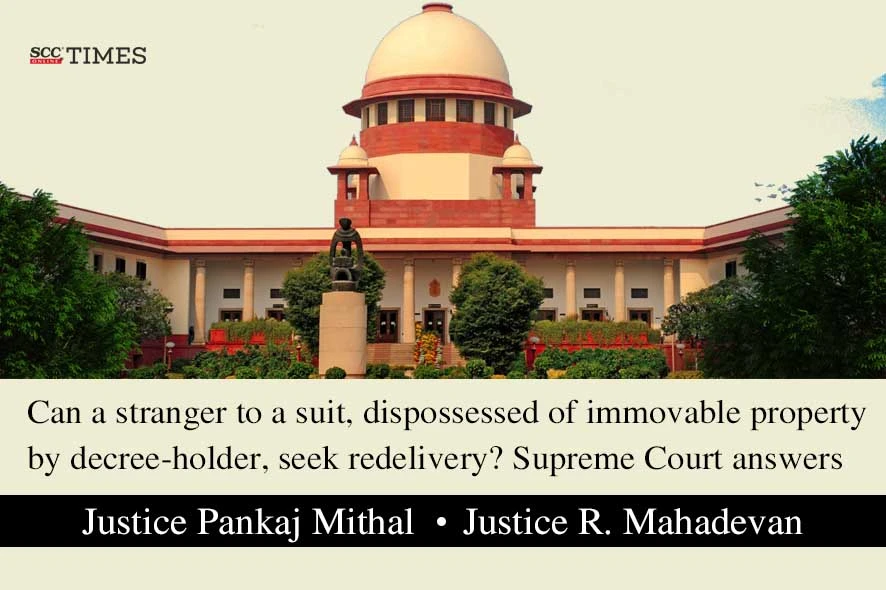Supreme Court: While considering the instant appeal seeking interference of the Court regarding issues related to independent right, title or interest claimed by the parties in a suit property, the Division Bench of Pankaj Mithal and R. Mahadevan*, JJ., held that “any person” not a party to the suit or in other words a “stranger to the suit” can seek redelivery, after he has been dispossessed. The term “Stranger” would cover within its ambit, a pendent lite transferee, who has not been impleaded.
Background:
The facts of the instant case date back to 1911 whereby the owner of the schedule property executed a mortgage in favour of K and created a further mortgage in favour of the same mortgagee in 1919. On the death of the owner, his six children assigned their 6/8 shares in favour of R, by gift deed dated 17-07-1963 and the remaining 2/8 shares were obtained by Defendant 1.
On the death of the mortgagee K, his rights devolved on the Defendant 1 and the original plaintiff P (who was a minor at that time). Defendant1, without the concurrence of P, executed a mortgage for Rs.1,000/- in favour of one N, in 1949 and N, in turn, assigned his right to the Defendant 10, who in turn assigned his right to R.
In the final decree passed in the matter, the plaintiff was allotted one half portion of the property and Defendant 10 was directed to pay a sum of Rs.461.67 towards equalisation and mesne profit at the rate of Rs 64.80 per year to the plaintiff. To execute the final decree, the plaintiff preferred an Execution Petition in which notice was ordered to the Defendants/ judgment debtors, but they did not turn up. Ultimately, the Executing Court ordered delivery of possession and accordingly, a portion of plaint schedule property, was delivered to the plaintiff on 22-11-1994.
Thereafter R preferred an application under Order XXI Rule 99 of CPC for redelivery of the afore-stated property, claiming independent right, title and interest in the same. However, his application and subsequent appeal was dismissed. Legal representatives of R applied for review before Kerala High Court whereby the High Court allowed the appeals and remanded the matter to the Trial Court for fresh consideration.
In the instant appeal, the appellants are the legal representatives of P who was the original plaintiff /decree holder, and respondents are legal representatives of R.
Contentions:
Counsel for the appellants argued that the predecessor of R did not establish his independent right, title or interest in the property in question and he was only a pendente lite transferee and therefore, he cannot resist the execution of a decree filed by the original plaintiff / decree holder.
Per contra, counsel for respondents argued that predecessor of the respondents under Order XXI Rule 99, CPC is entitled to raise the question of limitation for the execution of the decree, which has become time-barred.
Court’s Assessment:
Perusing the facts and contentions raised in the appeal, the Court considered the specific plea of the appellants regarding the predecessor of the respondents being pendente lite transferee, hence not entitled to file an application under Order XXI Rule 99, CPC and raise the question of limitation of the Execution Petition, to deprive the right of the appellants to enjoy the fruits of the decree.
Upon reading Order XXI Rule 99, CPC, the Court elucidated that Order XXI Rule 99 is lucid that where any person other than the judgment debtor is dispossessed of immovable property by the holder of a decree for the possession of such property, or where such property has been sold in execution of a decree, by the purchaser thereof, he may make an application to the Court complaining of such dispossession.
It also means that a third party to the decree has a right to approach the Court even after dispossession of the immovable property, which he was occupying.
The Court pointed out that in the instant case, the predecessor of the respondents (R) was not a party to the suit and he was dispossessed from the property, in execution of the decree passed in the suit and therefore, he who is purported to be a stranger to the decree, can very well adjudicate his claim of independent right, title and interest in the decretal property as per Order XXI Rule 99, CPC.
The Court further pointed out that facts that the property stood transferred to the predecessor of the respondents before the Final Decree was passed in 1970. While so, it was incumbent on the appellants to have impleaded the predecessor of the respondents by filing an application under Order XXI Rule 97 of CPC, when they resisted the delivery. “The pendent lite purchaser has every right to defend his right, title, interest and possession”.
The Court emphasised that once an application under Order XXI Rule 99, CPC is filed, it is incumbent upon the Trial Court to consider all the rival claims including the right title and interest of the parties under Order XXI Rule 101 which bars a separate suit by mandating the execution court to decide the dispute.
The Court then applied the ratio of Chiranji Lal (Dr.) v. Hari Das, (2005) 10 SCC 746, and found that Kerala High Court rightly set aside the order passed in the Execution Petition and remanded the matter to the trial court for fresh consideration, leaving all the issues including the independent right, title or interest claimed by the respondents in the property in question, to be adjudicated therein. In Chiranji Lal (supra) the Supreme Court had categorically held that, “The engrossment of the final decree in a suit for partition would relate back to the date of the decree. The beginning of the period of limitation for executing such a decree cannot be made to depend upon date of the engrossment of such a decree on the stamp paper”.
Hence, the Supreme Court did not find any infirmity or illegality in the impugned judgment of Kerala High Court which warranted the Court’s interference. Therefore, the appeals were dismissed.
CASE DETAILS
|
Citation: Appellants : Respondents : |
Advocates who appeared in this case For Petitioner(s): For Respondent(s): |
CORAM :








